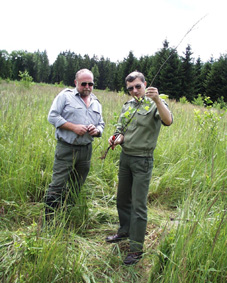Amelioration of forest soils by means of silicate rock meals
Vaclav Narovec & Frantisek Sach

Summary
The aim of the work to characterize the development of forest fertilization with the silicate rock meals and summarize the publications by the forest research workers in the Czech Rupublic. The knowledge in the period 1943 - 1964 and practical experience with the fertilization of soils and young forest plantations in forest stands or nurseries by means of silicate rock meals play an important role in the development of the forestry amelioration procedures in the Czech Republic (Nemec 1945 - 1958, Materna 1963). In former times the application of crushed basalt, diabase and gabbro rock on impoverished azonal soils, podsols, podsols with hardpan and on gley soil types has caused a very considerable growth increase of forest plantations and has made possible to grow hardwood species. The essential increase of the quantity of easily soluble nutrients and the reduction of acidity in the soil profile caused by the fertilization using basic eruptive rocks provokes a valuable amelioration of the nutrition of the forest plants with mineral substances, especially of Ca, Mg, K and P (Nemec 1950, 1956a).
At present (1990 - 1994), the basic amelioration rocks are important from the point of view of the necessary ecologization of the care for yield on agricultural soils (Brunnerova et al. 1990, Cepl and Lastovicka 1993, Dvorska et al. 1992, etc.). The application of silicate rock meals is relevant in the Czech forest nurseries, especially those established on extremely sandy soils (Narovec 1992). The positive adventages of the use of rock meals is mainly the improvement of physical properties of soils. In the Czech Republic the specialized firms were established for production, modification and distribution of suitable meals or dusts of basic amelioration rocks (basalt, amphibolite rock, etc.) in the forest management.
The joint-stock company Krofian (Hradec Kralove, the Czech Republic) exploits an amphibolite rock at Markovice village (near Caslav town in the Central Bohemia). The dust of crushed rock is separated at technology process and is distributed as a basic amelioration material for forest soils under commercial name Krosil. The rock dust type Krosil-001 with 42% rate of fractions under 0.05 mm was used in the test. The aim of the test was to characterize the effect of the different doses of amphibolite rock dust (Krosil-001) on selected physical and chemical properties of poor podsolic forest soils after 100 days' incubation of soil samples in the laboratory conditions. The graded portions of the material Krosil represented 0 (control), 2, 4, 8, 11, and 20% from weight of the soil samples. The tested rock meal shows a wide range of positive ameliorative and fertilizing effects: reduction of soil acidity, import of mineral nutrients, especially Ca and Mg, increase of basic cations content, increase of adsorption exchange capacity and base saturation percentage, support of biological activity affecting humification and nitrification of the organic-matter, etc. (Stenicka and Narovec 1994).
The practical application of basic rock meals is possible in the form soil surface application or mixing into the planting hole at the time of establishing of forest plantations. Effective use is supposed on the extreme forest localities, especially in the mountain regions, strictly according to local conditions.
Orig. citation (in Czech):
Narovec, V., Sach, F. 1994: Meliorace lesnich pud pomoci bazickych silikatovych hornin. Zpravy lesnickeho vyzkumu, 39, (3): p. 17 - 20.
Another source of information:
Stenicka, S. and Narovec, V. 1994: The effect of amphibolite rock meal from stone mine at Markovice village on selected physical and chemical properties of podsolic forest soils in the laboratory test. Zprávy lesnického výzkumu, 39, (3): p. 13 - 16. [Original in Czech with English summary].